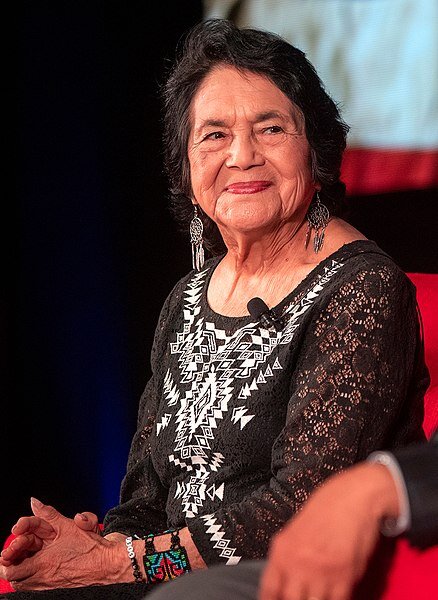In honor of National Hispanic Heritage Month, which today enters its final week, we are shining a spotlight on four important Hispanic activists who are not attorneys, but who have had an impact on United States law.
Joan Baez, the daughter of a prominent Mexican-American physicist, was born on Staten Island in 1941. In her late teens, she found herself immersed in the deeply political folk music scene of Cambridge, Massachusetts. Her debut album was released by Vanguard Records 60 years ago this month. In 1963, she entered households all over America through her performance of We Shall Overcome at the March on Washington. As discussed in No Direction Home, Baez radicalized Bob Dylan and introduced him to the folk scene. Often through interpretation of his songs, Baez and Dylan together created an iconic soundtrack to various political movements, including draft reform and lowering the age to vote. Baez has worked tirelessly for a wide variety of civil rights causes in the decades since, and these days posts images of her politically-charged paintings to her official Instagram as she continues to shape policy changes through her compelling art.
Raffi Freedman-Gurspan is not a lawyer, but has influenced the law as an LGBT activist and a White House staffer during the Obama administration. Born in Honduras in 1987, she was adopted by Americans as an infant, and raised in Brookline, an urban town that borders Boston. After a rise to prominence working with the National Center for Transgender Equality, Freedman-Gurspan accepted a position under President Obama as the Senior Associate Director for Public Engagement and the White House LGBT Community Liason. The Obama administration oversaw numerous regulatory changes that improved legal outcomes for transgender Americans. For example, prior to Freedman-Guspan’s tenure, in 2010 the Housing and Urban Development regulatory guidelines were updated to include transgender people under the Fair Housing Act protections against discrimination based on sex. Freedman-Guspan is currently a leader in the fight to reform gerrymandering laws, as a Deputy Director at All On the Line.
Dolores Huerta may be 90, but she remains an active advocate for labor reform and civil rights improvements. She may be best known for co-founding the National Farm Workers Association with Cesar Chavez in 1962. Huerta had previously founded the Agricultural Workers Association. Though originally from New Mexico, Huerta is now closely associated with California. One of the first successful campaigns she worked on was the 1960 effort to get California to provide its driver licensure exam in Spanish. Her decades of activism and lobbying efforts were crucial to the passage of the California Agricultural Labor Relations Act of 1975, a national labor law landmark. In 2002, she founded the Dolores Huerta Foundation, which promotes civic engagement so that average citizens can impact the legislative process through which laws are created.
Sylvia Mendez started her life as an activist at age 8, as the plaintiff in Mendez v. Westminister School Dist., 64 F. Supp. 544 - Dist. Court, SD California 1946. In that monumental case, the Ninth Circuit held that the policy of segregation in public schools was unconstitutional, paving the way for the 1954 ruling in Brown v. Board of Education. Mendez was among the first Hispanic students to attend a previously “all-white” public school in California. In 2011, President Obama awarded her a Presidential Medal of Freedom. Now age 84, she continues to speak out about her important experience as a young civil rights pioneer.
















